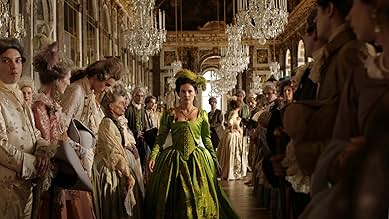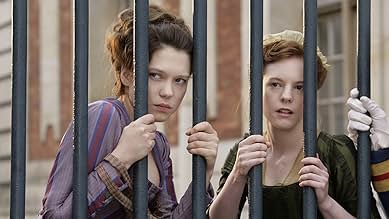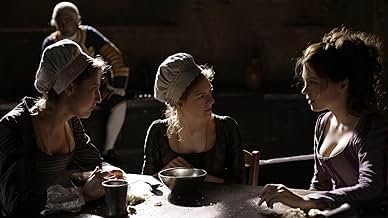VALUTAZIONE IMDb
6,2/10
9357
LA TUA VALUTAZIONE
Uno sguardo al rapporto platonico tra Maria Antonietta e una delle sue lettrici nei primi giorni della Rivoluzione francese.Uno sguardo al rapporto platonico tra Maria Antonietta e una delle sue lettrici nei primi giorni della Rivoluzione francese.Uno sguardo al rapporto platonico tra Maria Antonietta e una delle sue lettrici nei primi giorni della Rivoluzione francese.
- Regia
- Sceneggiatura
- Star
- Premi
- 6 vittorie e 12 candidature totali
Julie-Marie Parmentier
- La servante Honorine Aubert
- (as Julie-Marie Parmentier de la Comédie Française)
Marthe Guérin Caufman
- La domestique Alice
- (as Marthe Caufman)
Hervé Pierre
- L'abbé Hérissé
- (as Hervé Pierre de La Comédie Française)
Recensioni in evidenza
Written and directed by Benoît Jacquot and based on the novel by Chantal Thomas, Farewell, My Queen explores the death throes of the French monarchy over a period of three days in July, 1789. Set in the Palace of Versailles at the beginning of the French Revolution, Sidonie (Lea Seydoux), known as the reader for Queen Marie-Antoinette (Diane Kruger), is responsible for selecting books and reading them aloud to the queen. Because of her closeness to the monarch, she is able to act as a spy, securing information about events taking place inside and outside the palace, pressing selected servants for information, and eavesdropping on conversations to gather the most up-to-date gossip to pass along to Marie.
The film is seen from Sidonie's point of view, a vantage point that illuminates the sharp social divisions inside the palace with the servants living in crowded rat-infested quarters, and the royals dwelling in opulent accommodations. Lea Seydoux delivers a powerful performance as the devoted servant of the queen, conveying an air of mystery about who she really is in a way that adds to her allure. Kruger portrays Marie-Antoinette as sensual and hedonistic and there is a hint of more than Platonism in the way she interacts with both Sidonie and the Duchess de Polignac (Virginie Ledoyen), a relationship that tests Sidonie's loyalty.
On the morning of July 15th, news spreads rapidly that the king had been awakened at two in the morning. No one knows the reason, but fear spreads throughout the court. If the king is ill, who will protect those totally dependent on the nobles who control their lives? It is soon revealed, however, that the king is not ill, but that a mob has stormed the Bastille and a revolt has begun against the aristocracy. Little information is available. Rumors abound based only on conversations whispered in the hallways and the servant's quarters. When the King travels to Paris and the Queen decides against an escape to Metz, an aura of inevitably descends on the Palace and the nobles begin to abandon ship, competing for places on the coaches seeking a safe haven.
Antoinette makes every effort to continue with business as usual, looking at magazines to admire new styles and colors for the coming season, paying scant attention to the fact that her name is number one in a list of 300 targets for the guillotine. Fearful of losing her only connection to the world, Sidonie is willing to risk the ultimate sacrifice if it is in the queen's best interest. Even though Farewell, My Queen is historically questionable and may hold us at arms length emotionally, it provides a fresh view of events that we know about only from history books or stuffy costume dramas.
Jacquot captures the authenticity of time and place and also the human side of the power struggle. Unfortunately, the film pays little attention to the issues that led to the revolt, never mentioning the abuse of power by the monarchy. Indeed, the Revolution serves only as a backdrop for the story which is more about seduction, loyalty, and betrayal than social upheaval. Rather than making a statement that is relevant for our times, the intricacies of sexual intrigue and love triangles dominate the film, titillating rather than persuading, and making the goings on difficult to care about.
The film is seen from Sidonie's point of view, a vantage point that illuminates the sharp social divisions inside the palace with the servants living in crowded rat-infested quarters, and the royals dwelling in opulent accommodations. Lea Seydoux delivers a powerful performance as the devoted servant of the queen, conveying an air of mystery about who she really is in a way that adds to her allure. Kruger portrays Marie-Antoinette as sensual and hedonistic and there is a hint of more than Platonism in the way she interacts with both Sidonie and the Duchess de Polignac (Virginie Ledoyen), a relationship that tests Sidonie's loyalty.
On the morning of July 15th, news spreads rapidly that the king had been awakened at two in the morning. No one knows the reason, but fear spreads throughout the court. If the king is ill, who will protect those totally dependent on the nobles who control their lives? It is soon revealed, however, that the king is not ill, but that a mob has stormed the Bastille and a revolt has begun against the aristocracy. Little information is available. Rumors abound based only on conversations whispered in the hallways and the servant's quarters. When the King travels to Paris and the Queen decides against an escape to Metz, an aura of inevitably descends on the Palace and the nobles begin to abandon ship, competing for places on the coaches seeking a safe haven.
Antoinette makes every effort to continue with business as usual, looking at magazines to admire new styles and colors for the coming season, paying scant attention to the fact that her name is number one in a list of 300 targets for the guillotine. Fearful of losing her only connection to the world, Sidonie is willing to risk the ultimate sacrifice if it is in the queen's best interest. Even though Farewell, My Queen is historically questionable and may hold us at arms length emotionally, it provides a fresh view of events that we know about only from history books or stuffy costume dramas.
Jacquot captures the authenticity of time and place and also the human side of the power struggle. Unfortunately, the film pays little attention to the issues that led to the revolt, never mentioning the abuse of power by the monarchy. Indeed, the Revolution serves only as a backdrop for the story which is more about seduction, loyalty, and betrayal than social upheaval. Rather than making a statement that is relevant for our times, the intricacies of sexual intrigue and love triangles dominate the film, titillating rather than persuading, and making the goings on difficult to care about.
A marvelous film. Very rarely does a film based on fact, especially a story as infamous as this one, succeed at creating such tension despite the fact that everyone knows pretty much what is going on and what will happen (United 93 springs to mind). As it is director Benoît Jacquot and his team have done a incredible job in capturing the confusion, uncertainty and pure dread that those living at Versailles in the final days of the Monarchy must have felt. Seriously, anyone who's ever dismissed period dramas and films based on true stories as "stuffy", slow and boring should give this one a shot. The cast is also exceptionally strong, led by a group of immensely talented female performers. The only downside is really the ending, unfortunately, slightly anticlimactic and a bit of a let down.
I must admit, when I went to see this film I thought: Not another picture about the revolution in France, I must have seen 20 already. I was pleased to find however that Benoit Jacquot has given the period a lot of thought, and has made one of the more effective costume films in recent years. His Sade of 2000 starred Daniel Auteuil and Isild le Besco, treating one of the lesser figures of the period with great insight into his character. Les adieux a la reine is no less engrossing; he takes us into the cramped corridors of the palace, where the small people live in dingy quarters and hope (usually fruitlessly) to be noticed by the royal couple. The night scene with the courtiers fearfully scanning the list of 286 notables who must have their heads chopped off, lit with a brackish yellow candle light is wonderfully effective.
The performances make the film. Diane Kruger, with her slight accent, makes a wonderful Marie Antoinette: sensing doom, yet still able to reach out to those around her. It's easy to see why Sidonie reveres her. Lea Seydoux, whom I hadn't noticed much up to now, shows much promise as an actress, scurrying around the palace trying to gather information about the riots in Paris. Her face is sometimes sullen, sometimes smiling, always interesting. Xavier Beauvois does well as the King. Finally Virginie Ledoyen as Yolande de Polignac--"the indisputably ravishing but dim-witted Yolande" as Simon Schama calls her. Ledoyen is as imperious and shallow as you could wish. You see how the Queen could lose her head (in both senses) over her.
The performances make the film. Diane Kruger, with her slight accent, makes a wonderful Marie Antoinette: sensing doom, yet still able to reach out to those around her. It's easy to see why Sidonie reveres her. Lea Seydoux, whom I hadn't noticed much up to now, shows much promise as an actress, scurrying around the palace trying to gather information about the riots in Paris. Her face is sometimes sullen, sometimes smiling, always interesting. Xavier Beauvois does well as the King. Finally Virginie Ledoyen as Yolande de Polignac--"the indisputably ravishing but dim-witted Yolande" as Simon Schama calls her. Ledoyen is as imperious and shallow as you could wish. You see how the Queen could lose her head (in both senses) over her.
It's July, 1789, and French citizenry is starting to revolt. Queen Marie Antoninette (Diane Kruger) is hold up at Château de Versailles with her court and her book reader (Léa Seydoux). When the news of the storming of the Bastille reaches them, panic sets in and the King's entourage start slipping away.
It's fascinating to see the various reaction as rumors start to spread. Léa Seydoux is great as the doe-eyed true believer. It is disconcerting to know her true naivety even though she has no idea. It's the source of the tension, but it's also infuriating. Diane Kruger is fine, but I thought that it wasn't quite big enough. However, the climax was just right.
It's fascinating to see the various reaction as rumors start to spread. Léa Seydoux is great as the doe-eyed true believer. It is disconcerting to know her true naivety even though she has no idea. It's the source of the tension, but it's also infuriating. Diane Kruger is fine, but I thought that it wasn't quite big enough. However, the climax was just right.
Farewell, My Queen is a French film that covers three days in the life of servant Sidonie. She is Marie Antoinette's reader. The three days cover the early days of the French Revolution as seen through her eyes. Be advised, this is not a film about Marie Antoinette. If you are entertained by the series Downton Abbey or Upstairs Downstairs and enjoying stealing a glimpse behind the inner workings of court life this film will not disappoint.
There is no exposition at the beginning of this film. The dialog is French with English subtitles. The original audience would be expected to be familiar with the basic history and players of the French Revolution. If you are not familiar, it's a good idea to review this time period before seeing the film.
A sense of mystery is evoked by a combination of narrative reveals and soundtrack. It's a handsome film that duly contrasts the masters and servants via costumes, sets and cinematography. The performances are particularly effective as Diane Kruger and Lea Seydoux are well cast and empathetic in their roles.
There is no exposition at the beginning of this film. The dialog is French with English subtitles. The original audience would be expected to be familiar with the basic history and players of the French Revolution. If you are not familiar, it's a good idea to review this time period before seeing the film.
A sense of mystery is evoked by a combination of narrative reveals and soundtrack. It's a handsome film that duly contrasts the masters and servants via costumes, sets and cinematography. The performances are particularly effective as Diane Kruger and Lea Seydoux are well cast and empathetic in their roles.
Lo sapevi?
- QuizIn this movie, Diane Kruger speaks French with a German/Austrian accent - which is undoubtedly how the Austrian-born Marie Antoinette would have spoken herself.
- BlooperOn several occasions when soldiers are marching through the main and side gates of Versailles, and also when Sidonie goes to Le Petite Trianon for the first time and falls into a puddle, you can clearly see the very 21st century anti-terrorism concrete security barriers and bollards flanking the gates.
- Citazioni
Agathe-Sidonie Laborde: In a way, Your Majesty, you're asking me to go as bait.
La reine Marie Antoinette: An ugly word for a pretty mouth!
Agathe-Sidonie Laborde: Words are all I possess. I wield them well.
- ConnessioniReferenced in Parole de cinéaste: Benoît Jacquot (2017)
I più visti
Accedi per valutare e creare un elenco di titoli salvati per ottenere consigli personalizzati
- How long is Farewell, My Queen?Powered by Alexa
Dettagli
- Data di uscita
- Paesi di origine
- Siti ufficiali
- Lingue
- Celebre anche come
- Farewell, My Queen
- Luoghi delle riprese
- Aziende produttrici
- Vedi altri crediti dell’azienda su IMDbPro
Botteghino
- Lordo Stati Uniti e Canada
- 1.597.998 USD
- Fine settimana di apertura Stati Uniti e Canada
- 72.100 USD
- 15 lug 2012
- Lordo in tutto il mondo
- 6.366.835 USD
- Tempo di esecuzione1 ora 40 minuti
- Colore
- Mix di suoni
- Proporzioni
- 2.35 : 1
Contribuisci a questa pagina
Suggerisci una modifica o aggiungi i contenuti mancanti

Divario superiore
By what name was Addio mia regina (2012) officially released in India in English?
Rispondi

































